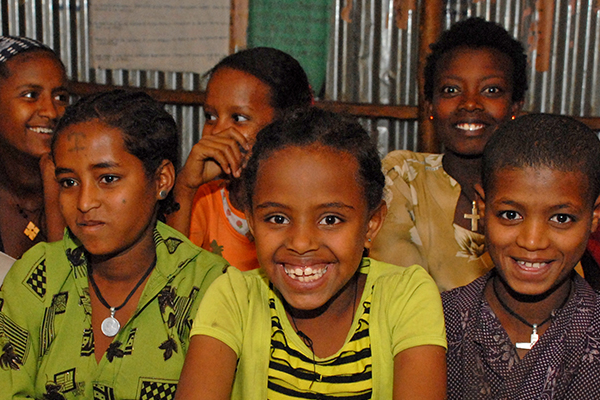
The Population Council and partners are expanding the implementation of Biruh Tesfa, an evidence-based program conceptualized by the Council to reduce the social isolation of vulnerable girls in urban Ethiopia, to reach girls living in forced domestic servitude, girls who are trafficked, as well as girls living with disabilities in Ethiopia.
Biruh Tesfa (“Bright Future”) reaches the poorest adolescent girls in urban Ethiopia, builds their literacy and numeracy skills, strengthens social support networks, and improves their knowledge and life skills. The project builds on a rigorous evidence base of girl-centered programs and two decades of experience to solve the challenges of reaching the most marginalized and invisible girls in Ethiopia with quality education and improved livelihoods.
Biruh Tesfa has been shown to significantly improve literacy and numeracy, and to increase girls’ reports of social support. Now with support from the Department for International Development (DFID), Biruh Tesfa for All will expand on and evaluate the program to reach more than 10,500 girls living in modern slavery, including forced domestic servitude, girls who are trafficked, and girls living with disabilities in Addis Ababa, Bahir Dar, Hawassa, and Shashamene.
“Biruh Tesfa has already been proven effective at not only reaching vulnerable girls, but improving their lives,” said Haney Shamil, project director for Biruh Tesfa. “This scale-up will help bring this evidence-based program to girls from marginalized populations who need it most.”
Biruh Tesfa for All will employ trained adult female mentors who go house to house to find eligible out-of-school girls between the ages of 10 and 19 and invite them to participate. Once they join the program, the girls meet regularly with the mentors and other girls in “safe spaces” groups. At meetings, mentors provide literacy and numeracy skills, using the government curriculum for alternative basic education, life skills, financial literacy, and entrepreneurship skills training.
Public meeting spaces and learning materials will be adapted for girls with disabilities, including visual, hearing, mobility, and intellectual impairments. Mentors’ teaching skills will be tailored to address girls with disabilities. Girls will receive support, including mobility aids, transport, and accompaniment to attend safe space meetings. Schools will also be upgraded to increase access and learning opportunities for girls with disabilities.
To date, Biruh Tesfa has reached more than 75,000 out-of-school girls in 18 cities in Ethiopia, including the capital, Addis Ababa. It is part of the Population Council’s portfolio of comprehensive, girl-centered programs, also including Berhane Hewan (“Light for Eve”) and Meseret Hiwott (“Base of Life”).
